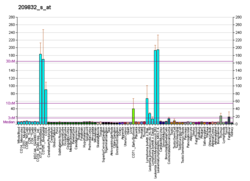
DNA replication factor CDT1
CDT1 (Chromatin licensing and DNA replication factor 1) is a protein that in humans is encoded by the CDT1 gene. It is a licensing factor that functions to limit DNA from replicating more than once per cell cycle.
Role in pre-replication complexes
The protein encoded by this gene is a key licensing factor in the assembly of pre-replication complexes (pre-RC), which occurs during the G1 phase of the cell cycle. In the assembly of pre-RCs, origin recognition complexes (ORC1-6) recognize and bind to DNA replication origins. CDT1, along with the protein CDC6, are then recruited to the forming pre-RC, followed by minichromosome maintenance complexes (MCM2-7).
The activity of CDT1 during the cell cycle is tightly regulated during the S phase by the protein geminin, which inhibits it, and by SCFSKP2, which ubiquinates the protein to tag it for proteasomal degradation. This regulation is important in preventing relicensing, thus ensuring that DNA is only replicated once per cell cycle.
Orthologs
CDT1 belongs to a family of replication proteins conserved from yeast to humans. Examples of orthologs in other species include:
- S. pombe – CDT1 (CDC10-dependent transcript 1)
- Drosophila melanogaster – 'double parked' or Dup
- Xenopus laevis - CDT1
Interactions
DNA replication factor CDT1 has been shown to interact with SKP2. Cdt1 is recruited by the origin recognition complex in origin licensing. Null-mutations for CDT1 are lethal in yeast; the spores undergo mitosis without DNA replication. The overexpression of CDT1 causes rereplication in H. sapiens, which activates the Chk1 pathway, preventing entry into mitosis.
Further reading
- Xouri G, Dimaki M, Bastiaens PI, Lygerou Z (2007). "Cdt1 interactions in the licensing process: a model for dynamic spatiotemporal control of licensing". Cell Cycle. 6 (13): 1549–52. doi:10.4161/cc.6.13.4455. PMID 17598984.
- Andersson B, Wentland MA, Ricafrente JY, et al. (1996). "A "double adaptor" method for improved shotgun library construction". Anal. Biochem. 236 (1): 107–13. doi:10.1006/abio.1996.0138. PMID 8619474.
- Yu W, Andersson B, Worley KC, et al. (1997). "Large-scale concatenation cDNA sequencing". Genome Res. 7 (4): 353–8. doi:10.1101/gr.7.4.353. PMC 139146. PMID 9110174.
- Nishitani H, Lygerou Z, Nishimoto T, Nurse P (2000). "The Cdt1 protein is required to license DNA for replication in fission yeast". Nature. 404 (6778): 625–8. Bibcode:2000Natur.404..625N. doi:10.1038/35007110. PMID 10766248. S2CID 205005540.
- Whittaker AJ, Royzman I, Orr-Weaver TL (2000). "Drosophila double parked: a conserved, essential replication protein that colocalizes with the origin recognition complex and links DNA replication with mitosis and the down-regulation of S phase transcripts". Genes Dev. 14 (14): 1765–76. doi:10.1101/gad.14.14.1765. PMC 316778. PMID 10898791.
- Wohlschlegel JA, Dwyer BT, Dhar SK, et al. (2001). "Inhibition of eukaryotic DNA replication by geminin binding to Cdt1". Science. 290 (5500): 2309–12. Bibcode:2000Sci...290.2309W. doi:10.1126/science.290.5500.2309. PMID 11125146.
- Yanagi K, Mizuno T, You Z, Hanaoka F (2002). "Mouse geminin inhibits not only Cdt1-MCM6 interactions but also a novel intrinsic Cdt1 DNA binding activity". J. Biol. Chem. 277 (43): 40871–80. doi:10.1074/jbc.M206202200. PMID 12192004.
- Bermejo R, Vilaboa N, Calés C (2003). "Regulation of CDC6, geminin, and CDT1 in human cells that undergo polyploidization". Mol. Biol. Cell. 13 (11): 3989–4000. doi:10.1091/mbc.E02-04-0217. PMC 133609. PMID 12429841.
- Strausberg RL, Feingold EA, Grouse LH, et al. (2003). "Generation and initial analysis of more than 15,000 full-length human and mouse cDNA sequences". Proc. Natl. Acad. Sci. U.S.A. 99 (26): 16899–903. Bibcode:2002PNAS...9916899M. doi:10.1073/pnas.242603899. PMC 139241. PMID 12477932.
- Li X, Zhao Q, Liao R, et al. (2003). "The SCF(Skp2) ubiquitin ligase complex interacts with the human replication licensing factor Cdt1 and regulates Cdt1 degradation". J. Biol. Chem. 278 (33): 30854–8. doi:10.1074/jbc.C300251200. PMID 12840033.
- Cook JG, Chasse DA, Nevins JR (2004). "The regulated association of Cdt1 with minichromosome maintenance proteins and Cdc6 in mammalian cells". J. Biol. Chem. 279 (10): 9625–33. doi:10.1074/jbc.M311933200. PMID 14672932.
- Sugimoto N, Tatsumi Y, Tsurumi T, et al. (2004). "Cdt1 phosphorylation by cyclin A-dependent kinases negatively regulates its function without affecting geminin binding". J. Biol. Chem. 279 (19): 19691–7. doi:10.1074/jbc.M313175200. PMID 14993212.
- Liu E, Li X, Yan F, et al. (2004). "Cyclin-dependent kinases phosphorylate human Cdt1 and induce its degradation". J. Biol. Chem. 279 (17): 17283–8. doi:10.1074/jbc.C300549200. PMID 15004027.
- Ramachandran N, Hainsworth E, Bhullar B, et al. (2004). "Self-assembling protein microarrays". Science. 305 (5680): 86–90. Bibcode:2004Sci...305...86R. doi:10.1126/science.1097639. PMID 15232106. S2CID 20936301.
- Ballabeni A, Melixetian M, Zamponi R, et al. (2005). "Human geminin promotes pre-RC formation and DNA replication by stabilizing CDT1 in mitosis". EMBO J. 23 (15): 3122–32. doi:10.1038/sj.emboj.7600314. PMC 514931. PMID 15257290.
- Saxena S, Yuan P, Dhar SK, et al. (2004). "A dimerized coiled-coil domain and an adjoining part of geminin interact with two sites on Cdt1 for replication inhibition". Mol. Cell. 15 (2): 245–58. doi:10.1016/j.molcel.2004.06.045. PMID 15260975.
- Kulartz M, Knippers R (2004). "The replicative regulator protein geminin on chromatin in the HeLa cell cycle". J. Biol. Chem. 279 (40): 41686–94. doi:10.1074/jbc.M405798200. PMID 15284237.
- Beausoleil SA, Jedrychowski M, Schwartz D, et al. (2004). "Large-scale characterization of HeLa cell nuclear phosphoproteins". Proc. Natl. Acad. Sci. U.S.A. 101 (33): 12130–5. Bibcode:2004PNAS..10112130B. doi:10.1073/pnas.0404720101. PMC 514446. PMID 15302935.
External links
- Overview of all the structural information available in the PDB for UniProt: Q9H211 (Human DNA replication factor Cdt1) at the PDBe-KB.
- Overview of all the structural information available in the PDB for UniProt: Q8R4E9 (Mouse DNA replication factor Cdt1) at the PDBe-KB.
| Initiation |
|
||||||
|---|---|---|---|---|---|---|---|
| Replication |
|
||||||
| Termination | |||||||




